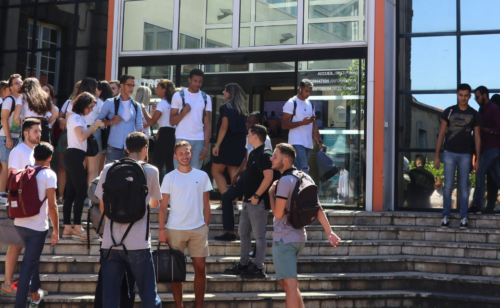

- ESC Clermont Business School
- International
- Study with us
- Programmes
- Bachelor in International Management
- Bachelor in Digitale Communication & E-Commerce
- Master in Management
- Programme Grande Ecole online
- MSc – Master of Science Business Intelligence & Analytics
- MSc – Master of Science Corporate Finance and Fintech
- MSc – Master of Science International Commerce & Digital Marketing
- MSc – Master of Science Project Management
- MSc – Master of Science Purchasing & Supply Chain Management
- MSc – Master of Science Strategy & Design for the Anthropocene
- MSc Innovative Project Management (Work-Study Format)
- Doctorate of Business Administration (DBA)
- Executive Education (French only)
- International Students
- Tools & pedagogical support
- Programmes
- Faculty & Innovation
- Company & Career
- News & Events

Do Students in Top Schools Have the Same Ambitions?
The High Council for Gender Equality presented the results of its sixth annual study on sexism in France. It reveals that one in five men under the age of 35 considers it normal to earn more than a woman in an equivalent position. This result raises questions. Far from fading away, stereotypes seem persistent. But what do students in top schools think?
On Wednesday, December 13, 2023, the French Association of Diversity Managers, in partnership with the Conference of Grandes Écoles (CGE) and ESC Clermont BS, presented the results of the third barometer on gender stereotypes and professional values of students in top schools. This study aims to identify and decipher how certain social beliefs shape educational paths and career choices.
To learn more about this barometer and its results, we put some questions to Pascale Borel, lecturer-researcher at ESC Clermont BS and co-author of this study conducted with Tanguy Bizien, Head of Studies, and Manon Ouvrard, Study and Project Officer at AFMD.

What is the theme of this barometer, and what is the particularity of the latest edition?
The common thread of all editions of our barometer has been to highlight gender stereotypes. This year, with my co-authors Tanguy Bizien and Manon Ouvrard, we chose to focus more specifically on the theme of ambition. Indeed, it seemed interesting to explore this concept.
As with previous editions, the survey was sent to students of Grandes Écoles through institutions affiliated with the CGE and the AFMD. We collected over 4,200 responses, allowing us to establish a sample of 3,585. Year after year, the success of this survey confirms the interest shown by top schools and students in the subject. The overrepresentation of women in the sample is also a strong indication of the particular interest young women have in the barometer’s theme.
For the past 3 years, you have published the barometer on gender stereotypes and professional values of students in top schools. Were you surprised by the results of this 3rd edition?
We do not observe a real break concerning gender stereotypes… Changing mentalities is a lengthy process. However, it is worth noting that, as with previous editions, a very large majority of respondents, precisely 80.1% of students, consider that men and women have the same skills. This result indicates a genuine aspiration for equality expressed and claimed by the students. But despite this encouraging figure, only a minority manages to completely break away from stereotypes. Indeed, when we list the 23 professional skills selected for the study separately, only 39.5% of the sample attribute the same qualities to men as to women.
Do you believe that gender stereotypes influence the paths of students in top schools?
We already know that career choices and educational paths are gendered. In this respect, while management schools almost achieve parity in their promotions, the “enrollment” survey produced each year by the CGE shows that, on average, engineering schools are composed of about two-thirds men and one-third women (this distribution varies greatly depending on the specialties of engineering schools). Our survey attempts to go further by showing that after entering these top schools, women and men have different professional expectations and ambitions.
Through this barometer, you explore the notion of ambition, a concept that has long been perceived as strictly masculine. What conclusion do you draw from the results of your survey?
With my co-authors, we sought to understand how young women and men position themselves regarding the notion of professional ambition. The results show that young women are significantly more likely to assert their ambition. This result contradicts the received idea that ambition is masculine.
Moreover, the markers of ambition are not quite the same as before. The survey shows that this notion is no longer as stereotyped as before and that it is no longer merely synonymous with success and social advancement. It manifests itself somewhat differently among women. The responses of students suggest the emergence of professional expectations related to the “collective” (“Helping others or the planet”) and the place of work (“Having a work-life balance”). These results echo several studies highlighting a strong need among young generations to have a better work-life balance and to give meaning to their work.
How can top schools make use of the barometer’s results?
As with previous editions, we presented the results of our barometer to all members of the AFMD and the CGE during a feedback event, the replay of which is available online. The report is also freely accessible on the AFMD website to feed everyone’s reflections.
Despite the progress observed, there is still a long way to go for gender stereotypes to disappear from mentalities… However, we must keep in mind that stereotypes do not appear magically upon entering a particular school. They are present from childhood and are generally conveyed and perpetuated by the social environment (family, friends, media, society). For all these reasons, it seems essential to continue raising awareness among younger generations and to strengthen our efforts to deconstruct gender stereotypes within top schools.
Related with




Stay updated with the latest news from ESC Clermont Business School by subscribing to our newsletter!
Merci ! Vous êtes maintenant abonné(e) à notre newsletter.
Vous recevrez dorénavant notre newsletter mensuelle.
@bientôt
We faced problems while connecting to the server or receiving data from the server. Please wait for a few seconds and try again.
If the problem persists, then check your internet connectivity. If all other sites open fine, then please contact the administrator of this website with the following information.
TextStatus: undefined
HTTP Error: undefined
Some error has occured.
